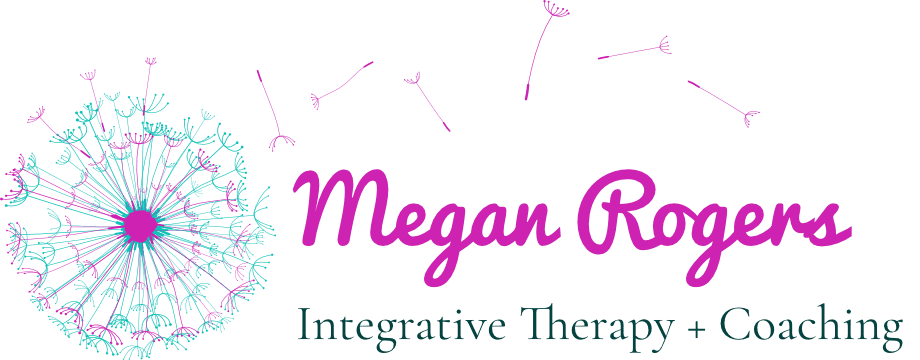(Absolutely Everything.*)
Mindfulness has been a hot topic in our culture for quite a few years. In some cultures, mindfulness has been a hot topic for, like, thousands of years. I was first turned onto it when I took a Mindfulness-Based Stress Reduction course when I was in graduate school, so you know it’s been a while. I thought it was cool. Kinda boring, but relaxing. I wasn’t sure if I was doing it correctly. I didn’t always do my homework, because I had so much actual homework to do. Then I got busy and I dropped out.
 Over the past 10 years, I’ve found myself coming back to mindfulness again and again. I was teaching it to clients and not practicing what I preach, practicing without consistency. I knew, in my heart and brain, that this thing called mindfulness is key to dealing with pretty much every mental health concern, nearly any type of stress, physical pain, and, and just.about.everything. It’s not even really debatable at this point. There have been thousands of solid, peer-reviewed research articles published on this subject. It’s, like, science. (And finally, after all these years, I’m happy to report that it’s a consistent part of my life and helps me feel awesome, and not cuckoo, most of the time.)
Over the past 10 years, I’ve found myself coming back to mindfulness again and again. I was teaching it to clients and not practicing what I preach, practicing without consistency. I knew, in my heart and brain, that this thing called mindfulness is key to dealing with pretty much every mental health concern, nearly any type of stress, physical pain, and, and just.about.everything. It’s not even really debatable at this point. There have been thousands of solid, peer-reviewed research articles published on this subject. It’s, like, science. (And finally, after all these years, I’m happy to report that it’s a consistent part of my life and helps me feel awesome, and not cuckoo, most of the time.)
So what is mindfulness? The founder of Mindfulness-Based Stress Reduction, John Kabat-Zinn (pretty much a hero in this mind/body world of ours), defines mindfulness as “the awareness that emerges through paying attention on purpose, in the present moment, and nonjudgmentally to the unfolding of experience moment by moment.” I added that bold text for you so you would pay attention to those words.
Because really, that’s all it is. Mindfulness is an incredibly simple concept, paying attention to what’s going on in the present moment, the NOW, and not judging it. You can be mindful of everything, from the information gained from your 5 senses at any given moment, to the thoughts you think and the emotions you feel, to each breath that you breathe.
I’m going to leave you with some why’s about mindfulness today; why we should practice it and why it’s so important. In other articles, I’ll share some of my favorite how’s and I will eventually really geek out with you a bit about brain things. And probably also Buddha things. But for now (the present moment)!
This list will be pretty similar to the benefits of meditation, because they’re very similar (in fact, I think of mindfulness as a type of meditation that you can do seated with your legs crossed and eyes closed, or while you’re walking down the street, or doing anything and everything in between.)
Mindfulness:
- lowers stress.
- increases self-acceptance (of self, of emotions, of others).
- lowers blood pressure, decreases inflammation, and boosts immunity.
- decreases cognitive functioning at bedtime (= sleep!).
- increases cognitive functioning during the daytime (increases focus and concentration).
- reduces anxiety, depression, feelings of stress, emotional eating, anger, etc. (and can help catch them before things get messy).
- increases knowledge about yourself, helps develop empathy and compassion for self and others.
- improves your relationships and your overall senses of wellbeing and gratitude.
- And, there are studies that show people who meditate can actually, literally, change their brains and reduce the likelihood of conditions such as heart disease and cancer.
Who knew paying attention could be so super beneficial?
Again, this is just about being present and being aware and not judging what you notice. And, while it’s an incredibly simple concept, it can be incredibly difficult to put into practice. The good news is, you don’t need to set aside an hour or even 30 minutes to practice mindfulness. You can do it while you’re doing all your other busy-life stuff, or set aside 5 minutes to practice your breathing. (Because, give me a break, you have 5 minutes.) More on all that in other posts, but for now, I’ll leave you with something that one of my mentors, Gabrielle Bernstein, says when people say, “I don’t have time to meditate.”
“Do you have time to feel like shit?”
*(Did you see what I did there? You should know I will do almost anything in order to incorporate a nod to music whenever possible. But you may not get it unless you’re over 35 or a hippie.)

